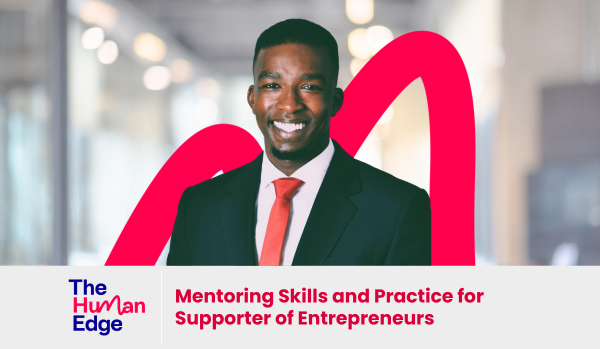Dr. Keni Kariuki, a seasoned agricultural political economist and institutional development expert, wears many hats. Whether he’s strategising on how to support entrepreneurs at Impact Hub Nairobi or working hands-on with early-stage businesses, his influence is far-reaching. As a director at Impact Hub Nairobi and Co-Network, he is deeply engaged in strengthening the entrepreneurial ecosystem in Kenya. His work centres around supporting social entrepreneurs as they navigate the complexities of launching and scaling their businesses. But as he recognised early on, technical training and financial support alone weren’t enough – entrepreneurs needed something more.
Keni’s journey with mentoring began through his interactions with entrepreneurs who consistently voiced a need beyond networking events and training sessions. They needed sustained, meaningful guidance from those who had walked similar paths. This realisation led Keni to join The Human Edge’s Mentoring Skills and Practice (MSP) course in 2024, seeking to deepen his understanding of mentoring and refine how his organisation integrates it into their support framework.
For Keni, the MSP course wasn’t just another leadership development programme—it was a game changer in how he approached mentoring. The course’s focus on active listening, powerful questioning techniques, and structured feedback provided him with a new perspective on how to effectively guide and support entrepreneurs. “I’ve always valued mentoring, but this course gave me the structure and tools to do it well. It reinforced what I intuitively knew but also introduced methodologies I hadn’t considered before.”
One of the biggest revelations for Keni was the importance of setting clear expectations and boundaries in mentoring relationships. While trust and confidentiality were always assumed, he realised that defining roles explicitly created a stronger foundation for impactful engagements.
Keni didn’t just complete the MSP course—he took its lessons and integrated them into Impact Hub Nairobi’s mentoring initiatives. The course helped refine their approach to mentor-mentee matching, training of trainers, and structuring mentoring agreements.
“We now have a clearer framework for how we train mentors, structure relationships, and measure success. It’s no longer just about making a connection; it’s about ensuring that connection leads to real, tangible outcomes.”
The course also influenced Keni’s leadership style. He found himself applying mentoring techniques internally – creating more space for open dialogue, encouraging reflective feedback, and ensuring his team members felt heard. These subtle shifts, while not always immediately measurable, have enhanced team dynamics and contributed to a more open, engaged organisational culture.
The true impact of the MSP course extends beyond Keni and his team. Today, Impact Hub Nairobi provides structured mentoring support to 10-15 entrepreneurs per month, helping them move from ideation to investment readiness. Through clearer training methodologies and a deeper understanding of mentoring principles, they are building a pipeline of business leaders who are not only skilled but also supported holistically.
Looking ahead, Keni envisions a future where mentoring isn’t just an optional add-on but an integral part of how entrepreneurship support organisations operate. “The future of entrepreneurial support is holistic—it combines financial support, technical training, and the human connection that mentoring provides.”
Why MSP Matters
For those considering the MSP course, Keni’s message is clear: “If you’re working with entrepreneurs, you need to understand mentoring. This course doesn’t just teach you how to mentor; it shows you how to build a mentoring culture that benefits both mentors and mentees. The skills are transferable, the impact is long-term, and the value is undeniable.”
Through leaders like Keni, the MSP course is not only shaping better mentors but also creating stronger, more resilient entrepreneurial ecosystems ones where mentoring is not an afterthought, but a core pillar of sustainable business growth.
Keni participated in the Westerwelle Foundation’s Mentor Programme in September 2024, alongside 55 mentors from Kenya, Rwanda, and Europe. For more details on the Mentoring Skills and Practice Course, click here.

